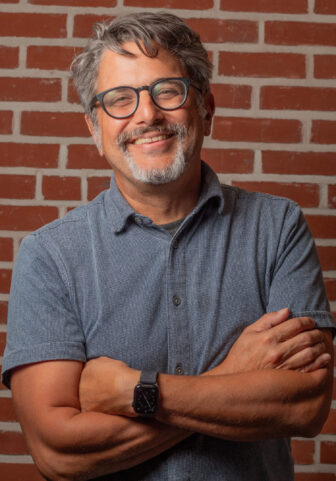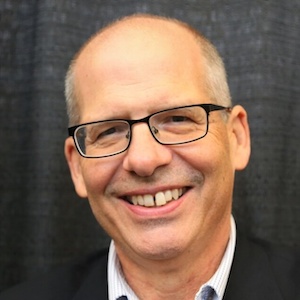NEPM, Latino Newsletter team up for election-focused media training

NEPM
The Latino Election Project team includes, from left, coordinator Donyel Le'Noir Felton, student interns Ian Burger and Evanni Santos, The Latino Newsletter executive director Julio Ricardo Varela and student intern Halima Mohamed.
A nine-week journalism training partnership created by The Latino Newsletter and New England Public Media in Springfield, Mass., is bringing student journalists and Latino perspectives to election coverage of western Massachusetts.
Three high school students are working with Julio Ricardo Varela, a veteran of Futuro Media Group and founder of its Latino Rebels podcast, as part of the Latino Election Project. Varela, who’s now executive director of The Latino Newsletter and a columnist for MSNBC, is guiding the students as they develop audio and digital reporting packages set to air this week.
The Latino Newsletter delivers daily digital coverage and podcasts with a “clear Latino lens.” It’s an independent nonprofit news site focusing on politics, culture and perspectives.
The students — Evanni Santos, Halima Mohamed and Ian Burger — applied to the election project through a competitive selection process that involved pitching their story ideas, Varela said. When they began as student interns in mid-September, they refined their pitches and began developing their stories. Varela meets with the students twice a week at NEPM’s headquarters.
The first story — on a shift among Latino voters in the region to identify as political independents — aired Tuesday. Text-based stories were published online by NEPM and The Latino Newsletter in English and Spanish.
Varela aims to release three more story packages before Nov. 5. Those will report on 18-year-olds registering to vote, obstacles to voting for Latinos in the region and issues affecting Latino-run businesses. Next week, the students will contribute to NEPM’s election coverage by interviewing Latino voters in Springfield about the election and its results.

“They’re learning how to do it and they’re determining it,” Varela said. “There’s no one path to get to an audio story. There’s a production process that we have to stick to, but I want them to feel confident that they can make choices that will make their story better.”
Varela, former president and editorial director of Futuro Media Group, sees the Latino Election Project as a model for public media stations to create coverage that truly represents Latinos in their communities.
The field has “a history that’s not quite positive when it comes to covering Latino communities in places like western Massachusetts,” he said. “The way to reach them is by covering their communities through a lens that they feel represents them.”
The Latino Election Project does that while “giving young high school students a taste of how to serve these communities and seeing if they have an interest in making this a career,” Varela said.
He recognizes that a nine-week program can’t “solve the representation issue with Latinos in public media,” and sees it as a start.
For NEPM, the dual-service public media group that includes New England Public Radio and WGBY-TV in Springfield, Mass., the project is a way to expand and enhance its election coverage, said John Sutton, VP of content and audience strategy.
“There’s an opportunity for the students and the election project team as a whole with Julio to bring some feature-length reporting to these issues,” Sutton said. “We’re doing more than we would have been able to do with existing resources, and it also frees up the newsroom to cover other issues — or some of the same issues — but bring a different perspective to those stories.”
NEPM’s editorial team helped students refine their pitches and align the stories with its own election coverage, Sutton said.
“The editorial team at NEPM has been very enthusiastic about the work of the student journalists and impressed to this point,” he said.

To reach more listeners from the Latino community, NEPM is placing ads on WSPR 1490 AM in West Springfield and 104.5 FM in Springfield, according to Sutton. Both are simulcasts of the Latin format Bomba Radio from WMRQ in Waterbury, Conn. WSPR has the ability to sell spots targeted for Springfield listeners, he said. It has already aired Spanish-language versions of NEPM-produced public service announcements on ballot questions and how to register to vote.
The students wrote and recorded English versions of the PSAs for NEPM, which aired the spots in all dayparts of its schedule for a week in September, Sutton said. WSPR is also running ads that point listeners to digital versions of the students’ election stories.
NEPM is experimenting with the ads “to see if we can actually find a way to reach audiences that would otherwise find or not hear materials through public media,” Sutton said.
Burger, a student intern from Longmeadow, Mass., said the work he’s done through the internship has been easier than he expected. He is reporting on Latino residents who face obstacles to voting. “I feel like I’m just sharing news, sharing facts,” he said.
Varela described his own role in the project as multifaceted. He sees himself as the students’ co-producer, cheerleader and peer in helping them develop their talents.
“When we as media leaders work with new, aspiring journalists, we have to make sure that they feel supported, they feel welcome, they feel confident and that they can do this,” Varela said. “And so far, there’s no indication that they can’t.”






